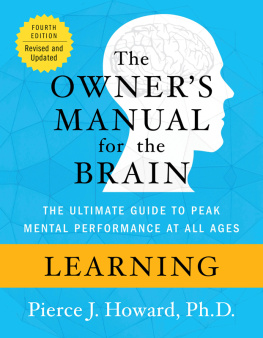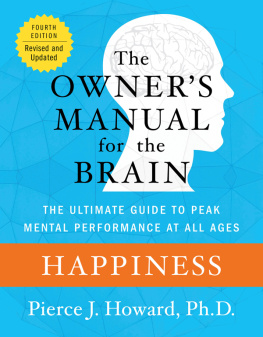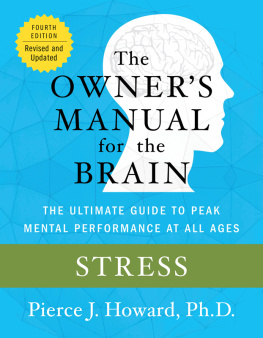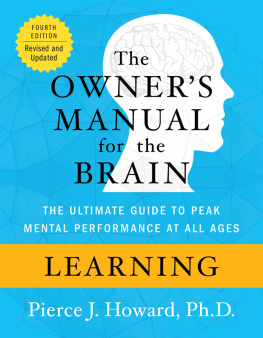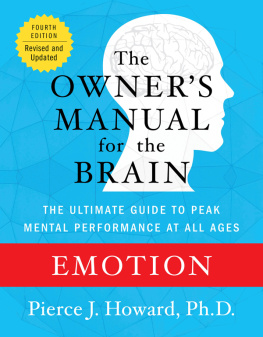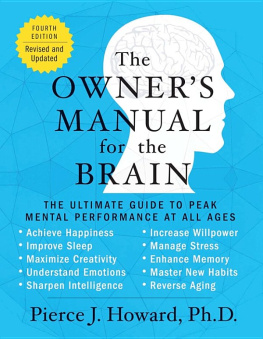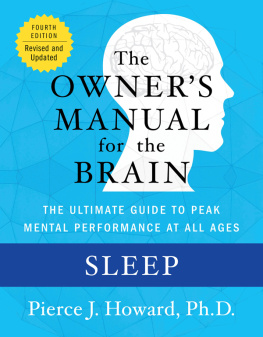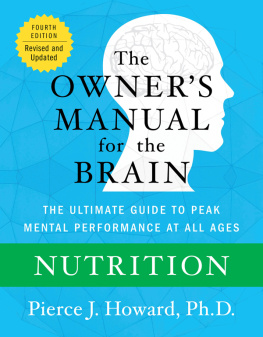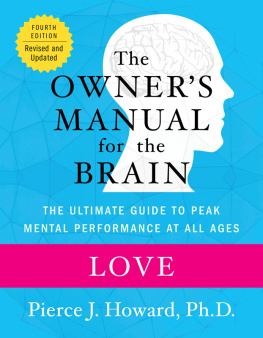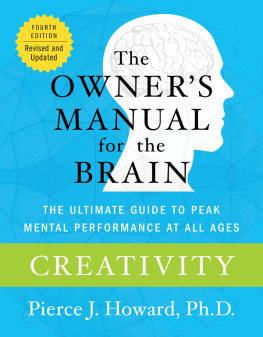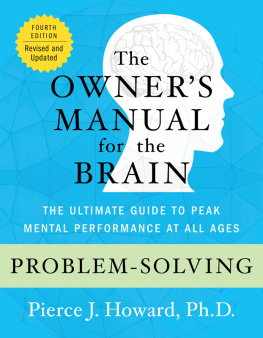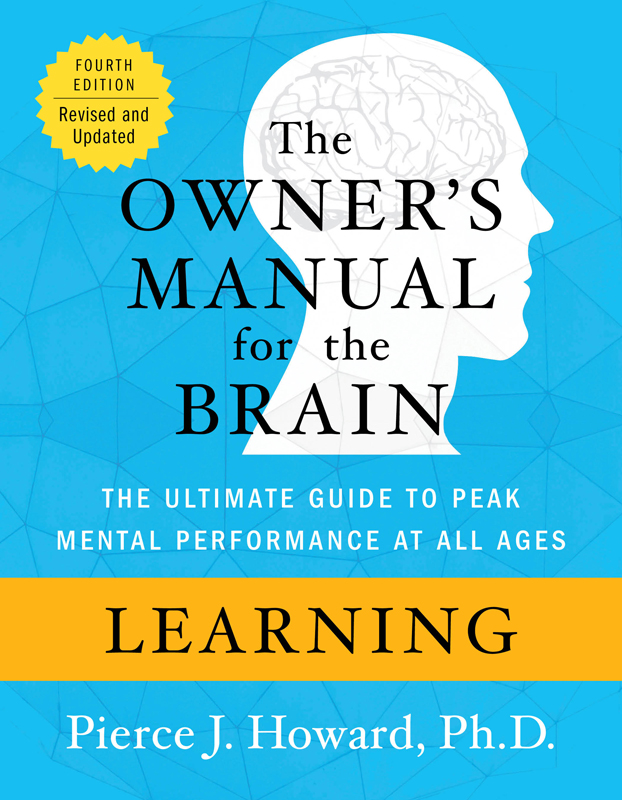Australia
HarperCollins Publishers (Australia) Pty. Ltd.
Level 13, 201 Elizabeth Street
Sydney, NSW 2000, Australia
http://www.harpercollins.com.au
Canada
HarperCollins Canada
2 Bloor Street East - 20th Floor
Toronto, ON, M4W, 1A8, Canada
http://www.harpercollins.ca
New Zealand
HarperCollins Publishers (New Zealand) Limited
P.O. Box 1
Auckland, New Zealand
http://www.harpercollins.co.nz
United Kingdom
HarperCollins Publishers Ltd.
77-85 Fulham Palace Road
London, W6 8JB, UK
http://www.harpercollins.co.uk
United States
HarperCollins Publishers Inc.
10 East 53rd Street
New York, NY 10022
http://www.harpercollins.com
Pierce J. Howard is director of research of the Center for Applied Cognitive Studies ( Cent ACS), a research and dissemination firm headquartered in Charlotte, North Carolina. His wife, Jane, is managing director at Cent ACS. Together, they develop both public and organizational programs based on the most current research in cognitive science. These programs include workshops, breakfast seminars, speeches, retreats, a website ( www.centacs.com ), custom-designed programs, and publications. Their special focus is on the Five-Factor Model of personality, for which they offer certification training and a wide range of support materials, software, services, advanced training programs, and annual learning conferences.
For the last 40 years, Dr. Howard has also been an organization development consultant. His motivation and, hence, his own professional development stem from a deep-seated desire to help others learn how to overcome their obstacles. He has attended numerous workshops and professional meetings, read extensively in the field, conducted computer database searches, and created hundreds of workshop designs in an unrelenting effort to find the best ways to help people solve problems, make decisions, create new approaches, and understand themselves and othersin effect, to take responsibility for their own growth and development both as individuals and as members of teams and organizations. Dr. Howards skill and interest in debunking myths and finding the most effective ways to help others learn has served him well in the business community.
Dr. Howard grew up in Kinston, North Carolina. He received his B.A. degree in 1963 from Davidson College and his M.A. degree in 1967 from East Carolina University, both in English. In 1972, he received his Ph.D. degree in education with a special emphasis in curriculum and research from the University of North Carolina at Chapel Hill. His college years were interrupted by a three-year tour with the U.S. Army in Germany, where he served as an intelligence specialist.
In addition to his writing, research, and dissemination responsibilities, Dr. Howard serves as Adjunct Professor of Organization Development at the McColl School of Business, Queens University, Charlotte, NC. His professional affiliations include membership in the American Psychological Association, the International Society for the Study of Individual Differences, and the Organization Development Network. In 1992, the Charlotte Area ASTD Chapter recognized him with its Excellence in Service to the Profession Award. He has written and published numerous workbooks, tests, and other materials for clients. The first edition of this book, The Owners Manual for the Brain, was published in 1994. In 2001, Pierce and Jane Howard published The Owners Manual for Personality at Work (Bard Press). In 2006, Pierce and Jane published The Owners Manual for Personality from 12 to 22 , a parallel version of the previous book that applies personality theory to the adolescent years. In the same year, Pierce and Jane came out with the second edition of The Owners Manual for Personality at Work . In August of 2013, Pierce published The Owners Manual for Happiness: Essential Elements of a Meaningful Life . For relaxation, they enjoy walking, cooking, chamber music, choral singing, reading, and camping. Their older daughter, Hilary, is a journalist and actress in New York, and their younger daughter, Allegra, is a Jazzercise manager and medical risk specialist in Charlotte. Together, they have provided the authors with four grandchildren as a sure way to remain young at heart (and mind).
Visit www.AuthorTracker.com for exclusive information on your favorite HarperCollins authors.
Liked what you just read? Click here to purchase the complete version of The Owners Manual for the Brain
Contents
LEARNING: THE OWNERS MANUAL . Copyright 2014 by Pierce J. Howard, Ph.D. Excerpted from THE OWNERS MANUAL FOR THE BRAIN, FOURTH EDITION . Copyright 2006, 2014 by Pierce J. Howard, Ph.D. All rights reserved under International and Pan-American Copyright Conventions. By payment of the required fees, you have been granted the nonexclusive, nontransferable right to access and read the text of this e-book on-screen. No part of this text may be reproduced, transmitted, downloaded, decompiled, reverse-engineered, or stored in or introduced into any information storage and retrieval system, in any form or by any means, whether electronic or mechanical, now known or hereinafter invented, without the express written permission of HarperCollins e-books.
FIRST EDITION
EPub Edition MAY 2014 ISBN 9780062227362
Cover design by Adam Johnson Cover image head by B-A-C-O/ Shutterstock Image, background courtesy of the Library of Congress; brain courtesy of the U.S. National Library of Medicine, History of Medicine Division
W hat sculpture is to a block of marble, education is to the human soul. Joseph Addison | Acquiring and Remembering Information |
L earning is memory; memory, learning. Learning entails two processes: acquiring and retaining. Psychologists and educators would call these processes short-term memory and long-term memory. Whether we are learning a telephone number, a chess strategy,
a role in a play, a dance step, or how to recover from a computer mishap, in order to say that we have learned something we must be able to demonstrate that not only have we acquired the knowledge or skill, i.e., that we understand it and can use it properly, but that we also have retained that understanding so that we may continue to use it over time. If we learn how to use something but forget soon afterward and must look it up (on the Internet, in a reference book, or from an associate), then we have only done half the job. To completely learn something, we must be able to use it repeatedly and independently. If I must continue to refresh a memory, I have only partially learned it.
A word of clarification is in order: To remember something is not the same thing as to memorize something. To memorize something is not the same thing as to learn something. Memory is used in two senses here. If I learn to play a Bach sonata, that means that I have mastered the notes and can play them for an audience. However, it does not mean that I have committed it to memory, or memorized it. Or I might learn to make a souffle without memorizing the ingredients. Or I might learn how to use a complex statistical formula without memorizing its elements. On the other hand, in all three cases, I might commit the elements to memorythe note, the ingredients, and the mathematical symbols, so that I am free of the texts that bear them. To memorize is a specific kind of learning goal that does not necessarily entail understanding. I could memorize a Latin quotation and speak it impressively at my next cocktail party without understanding a jot of it. So, the two meanings that we will necessarily modulate between are as follows: to remember how to use, do, or apply something, without regard to whether we need prompting as to the specifics, and to remember all of the details of something without needing any prompting as to the specifics. The first is like conducting Beethovens Fifth Symphony from a score, while the second is like conducting without the score. In both cases the conductor has learned the piece, but only in the second case have they memorized it. One can learn how to do something, and remember how to do it, without having memorized it.
Next page
